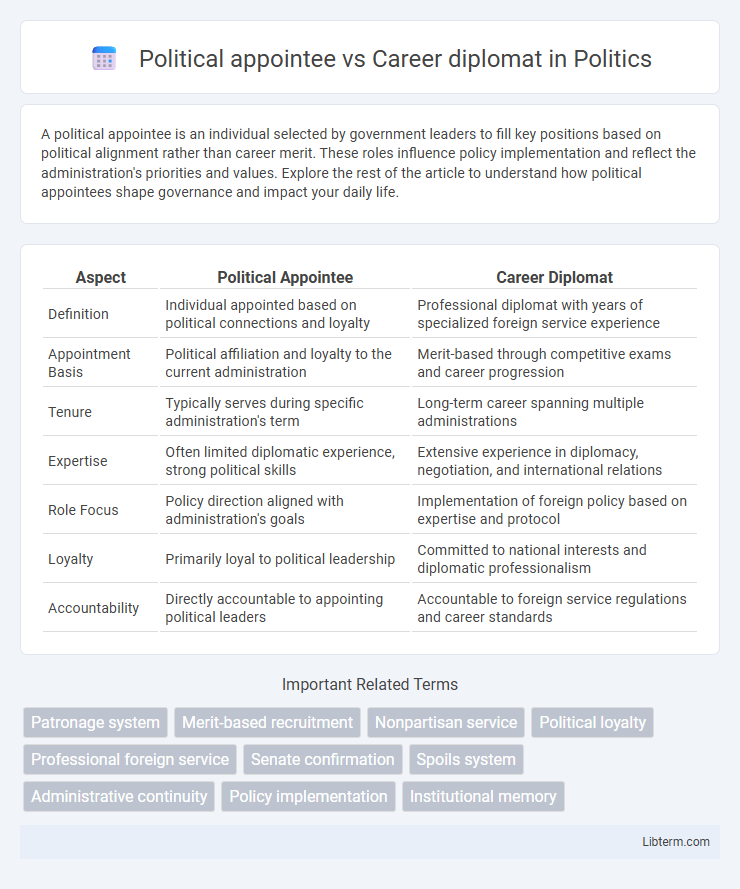A political appointee is an individual selected by government leaders to fill key positions based on political alignment rather than career merit. These roles influence policy implementation and reflect the administration's priorities and values. Explore the rest of the article to understand how political appointees shape governance and impact your daily life.
Table of Comparison
| Aspect | Political Appointee | Career Diplomat |
|---|---|---|
| Definition | Individual appointed based on political connections and loyalty | Professional diplomat with years of specialized foreign service experience |
| Appointment Basis | Political affiliation and loyalty to the current administration | Merit-based through competitive exams and career progression |
| Tenure | Typically serves during specific administration's term | Long-term career spanning multiple administrations |
| Expertise | Often limited diplomatic experience, strong political skills | Extensive experience in diplomacy, negotiation, and international relations |
| Role Focus | Policy direction aligned with administration's goals | Implementation of foreign policy based on expertise and protocol |
| Loyalty | Primarily loyal to political leadership | Committed to national interests and diplomatic professionalism |
| Accountability | Directly accountable to appointing political leaders | Accountable to foreign service regulations and career standards |
Introduction: Defining Political Appointees and Career Diplomats
Political appointees are individuals selected by elected officials to serve in government positions, often based on loyalty, political affiliation, or expertise relevant to the administration's goals. Career diplomats are professional foreign service officers who have advanced through merit-based systems, focusing on long-term international relations and diplomatic expertise. Understanding the distinction between these roles clarifies the balance between political influence and institutional continuity in foreign policy.
Historical Background of Diplomatic Appointments
Political appointees have historically been selected based on loyalty and alignment with the sitting government, often serving short terms that coincide with political administrations. Career diplomats emerge from professional foreign service ranks, trained through meritocratic systems that date back to the 19th century with the establishment of formal diplomatic corps. The evolution of diplomatic appointments reflects a balance between political influence and institutional experience in international relations.
Qualifications and Selection Processes
Political appointees typically have qualifications rooted in political loyalty, party affiliation, or campaign contributions, with selection processes heavily influenced by the sitting administration's preferences and strategic goals. Career diplomats undergo rigorous qualifications including completion of the Foreign Service Officer Test (FSOT), extensive training at the Foreign Service Institute, and competitive merit-based selection emphasizing foreign policy expertise and diplomatic skills. The contrasting selection processes underscore political appointees' alignment with current governmental policies, while career diplomats rely on established professional competencies and standardized assessments.
Roles and Responsibilities
Political appointees primarily serve as policy advisors and implementers aligned with the current administration's agenda, focusing on strategic decision-making, diplomatic negotiations, and representing national interests at a high level. Career diplomats, in contrast, provide institutional continuity and expertise by managing day-to-day diplomatic operations, conducting detailed policy analysis, and maintaining long-term relationships with foreign governments. Both roles are essential for balancing political directives with professional diplomatic practices in international affairs.
Advantages of Political Appointees
Political appointees bring fresh perspectives and align closely with the current administration's policy goals, ensuring consistent execution of the president's agenda. Their appointments often result in faster decision-making and greater flexibility in diplomatic approaches compared to career diplomats. Furthermore, political appointees can leverage their direct access to top political leaders, enhancing communication and influence in international negotiations.
Strengths of Career Diplomats
Career diplomats possess extensive expertise in international relations and deep knowledge of diplomatic protocols, enabling consistent and effective representation of national interests. Their long-term service fosters strong relationships with foreign counterparts, which enhances trust and communication crucial for successful negotiations. Institutional memory and adaptability to evolving global dynamics allow career diplomats to provide informed, strategic guidance and maintain continuity despite political changes.
Impact on Foreign Policy and Diplomacy
Political appointees often influence foreign policy by aligning diplomatic initiatives with the current administration's agenda, bringing a partisan perspective that can shift strategic priorities quickly. Career diplomats contribute deep institutional knowledge and long-term stability, ensuring continuity and nuanced understanding in complex international relations. The balance between political appointees and career diplomats affects the consistency, effectiveness, and adaptability of a nation's diplomatic efforts.
Challenges and Criticisms
Political appointees often face challenges related to limited diplomatic experience, which can hinder effective negotiation and understanding of complex international protocols. Career diplomats, while experienced, are sometimes criticized for being resistant to policy changes introduced by new administrations, potentially slowing down governmental agility. Both face scrutiny: political appointees for perceived partisanship and lack of expertise, and career diplomats for bureaucratic inertia and insufficient adaptability to evolving political directives.
Case Studies and Notable Examples
Political appointees often bring specific policy agendas and close ties to the current administration, as seen with John Bolton's controversial tenure as U.S. Ambassador to the United Nations, emphasizing aggressive foreign policy shifts. Career diplomats like Madeleine Albright demonstrate the impact of extensive diplomatic experience on nuanced negotiations and long-term strategy during her time as Secretary of State. Case studies reveal political appointees shaping immediate policy direction, while career diplomats provide institutional knowledge and continuity in international relations.
Conclusion: Balancing Both for Effective Diplomacy
Effective diplomacy requires a strategic balance between political appointees, who bring fresh perspectives aligned with current administration priorities, and career diplomats, who offer institutional knowledge and expertise developed through years of service. Leveraging the strengths of both ensures adaptive foreign policy execution and continuity in international relations. Optimal diplomatic outcomes depend on integrating political vision with seasoned professionalism to navigate complex global challenges.
Political appointee Infographic

 libterm.com
libterm.com